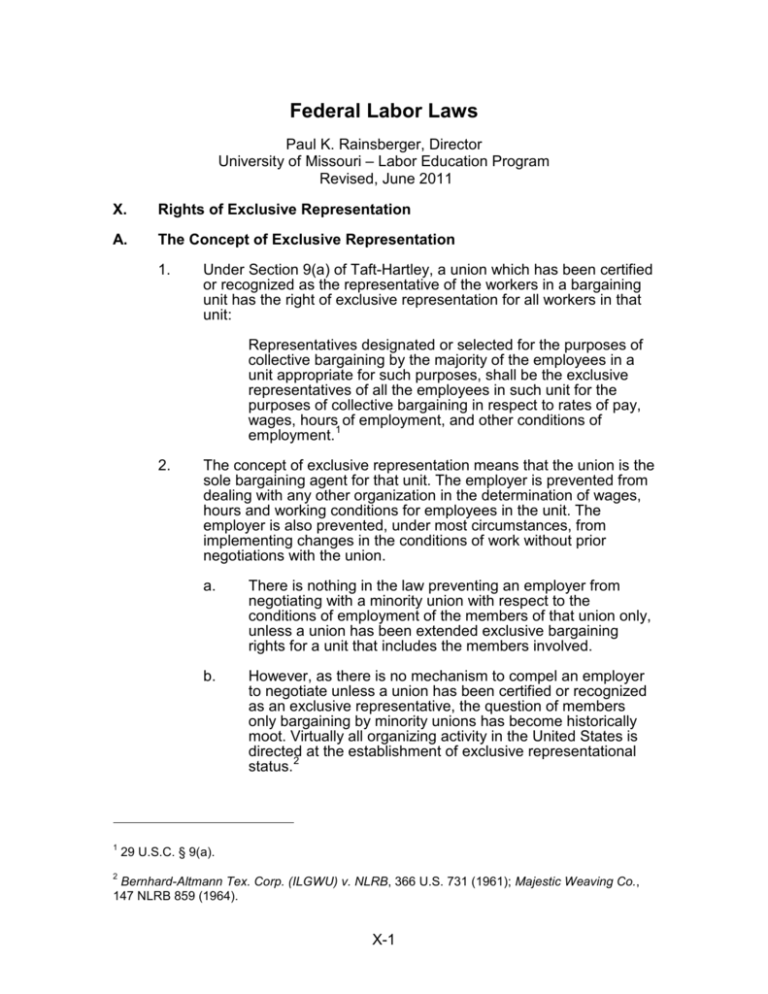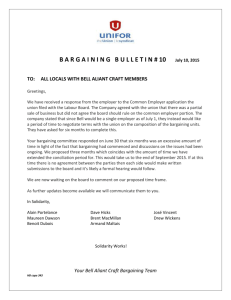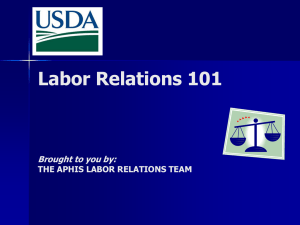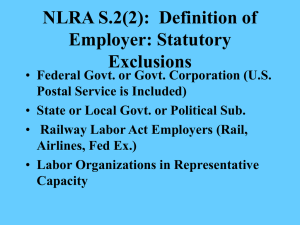Rights of exclusive representation
advertisement

Federal Labor Laws Paul K. Rainsberger, Director University of Missouri – Labor Education Program Revised, June 2011 X. Rights of Exclusive Representation A. The Concept of Exclusive Representation 1. Under Section 9(a) of Taft-Hartley, a union which has been certified or recognized as the representative of the workers in a bargaining unit has the right of exclusive representation for all workers in that unit: Representatives designated or selected for the purposes of collective bargaining by the majority of the employees in a unit appropriate for such purposes, shall be the exclusive representatives of all the employees in such unit for the purposes of collective bargaining in respect to rates of pay, wages, hours of employment, and other conditions of employment. 1 2. 1 The concept of exclusive representation means that the union is the sole bargaining agent for that unit. The employer is prevented from dealing with any other organization in the determination of wages, hours and working conditions for employees in the unit. The employer is also prevented, under most circumstances, from implementing changes in the conditions of work without prior negotiations with the union. a. There is nothing in the law preventing an employer from negotiating with a minority union with respect to the conditions of employment of the members of that union only, unless a union has been extended exclusive bargaining rights for a unit that includes the members involved. b. However, as there is no mechanism to compel an employer to negotiate unless a union has been certified or recognized as an exclusive representative, the question of members only bargaining by minority unions has become historically moot. Virtually all organizing activity in the United States is directed at the establishment of exclusive representational status. 2 29 U.S.C. § 9(a). 2 Bernhard-Altmann Tex. Corp. (ILGWU) v. NLRB, 366 U.S. 731 (1961); Majestic Weaving Co., 147 NLRB 859 (1964). X-1 B. 3. The duty of fair representation is the corollary to the right of exclusive representation. The right of exclusive representation has been interpreted to require that the union exercise its rights fairly, impartially and in good faith, without arbitrary or discriminatory treatment of represented workers. The duty applies both in the negotiation and the enforcement of collective bargaining agreements. 3 4. Individual contracts of employment negotiated with employees who are union represented are enforceable only to the extent that they are consistent with the concept of exclusive representation. 4 Individual agreements that provide benefits beyond those negotiated in the collective bargaining agreement are permissible only if the collective bargaining agreement specifically authorizes those individual contracts (e.g., professional athletic contracts where there is a basic contract for all members of the union, but also provisions for individuals based on various criteria). Expansion or waiver of rights through bargaining. 1. Once a union is selected as the exclusive bargaining agent for workers in a unit, the legal rights under Taft-Hartley may be seen as the minimum protections afforded to the individuals. 2. The collective bargaining process can both expand and limit the rights an individual has under the law. a. Most of the rights of workers under Section 7 of Taft-Hartley can be expanded by the collective bargaining agreement. For example, the basic Weingarten 5 right to request the presence of a union representative during investigatory interviews is routinely expanded by the bargaining process. b. Many rights recognized by the Board and courts can be limited or waived by the collective bargaining agreement. 6 For example, contracts routinely include "no-strike" clauses which are effective as waivers of the statutory right to strike. 7 A waiver of legal rights must be clear and unmistakable. 8 3 Federal Labor Laws: Outline XXXVI provides a discussion of the obligations of the union and the rights of the individual worker under the duty of fair representation. 4 J.I. Case Co. v. NLRB, 321 U.S. 332 (1944). 5 NLRB v. J. Weingarten, Inc., 420 U.S. 251 (1975). 6 Ador Corp., 150 NLRB 1658 (1965). 7 E.g., Mastro Plastics Corp., 350 U.S. 270 (1956). 8 E.g., Norris Industries, 231 NLRB 50 (1977). X-2 c. C. Individual Adjustment of Grievances 1. 2. 9 Some categories of rights recognized by the Board and courts apply equally to supporters and opponents of the union and dissidents within the organization. In these cases, the bargaining process cannot take away the rights of the individual to dissent. For example, the rules restricting employer limitations on employee solicitation and distribution cannot be waived by the collective bargaining agreement. 9 Section 9(a) contains a limited exception to the rights of exclusive representation. That section states that nothing prohibits an individual or group of workers from presenting grievances to the employer without the intervention of the bargaining representative. However, this limited exception has been narrowly interpreted. a. An individual attempting to handle a grievance under the Section 9(a) exception does so outside the contract. The normal steps of the negotiated grievance procedure do not apply, and any negotiated time limits do not toll while the individual is acting alone. b. There is no requirement that the employer settle anything with the individual. The employer can insist that the individual follow the negotiated procedures. c. If the employer adjusts the individual grievance, the union must be given an opportunity to be present. d. Any agreement reached under the Section 9(a) exception must not be inconsistent with the collective bargaining agreement. If the union is taking steps to resolve a grievance, and a group of workers go outside the bargaining relationship to apply collective pressure on the employer, they may be engaged in unprotected activity. 10 a. In the Emporium Capwell case, the dispute focused on allegations of racial discrimination by the employer. Although the union was actively attempting to settle the dispute in the grievance procedure, a group of workers enlisted the support of a community organization in a public demonstration against the company. b. Because of the implications of this case for employment discrimination law and the union’s duty of fair representation, the active efforts of the union to challenge the practices are Magnavox Co., 195 NLRB 265 (1972). 10 Emporium Capwell Co. v. WACO, 420 U.S. 50 (1975). X-3 important. Had the union neglected its duty, the Court left open the possibility that such protests would be protected. D. Worker participation in employer investigations. 1. The rights of the union as exclusive representative do not prevent the employer from involving employees in disciplinary investigations. While the Weingarten 11 rights limit the direct questioning of workers under investigation, the employer has considerable latitude in questioning other employee witnesses. 2. While the contract may create one, there is no legal right for a worker to refuse to respond to questions about a coworker's conduct. If an employee has first hand knowledge about an incident under investigation, the worker must respond. 3. If the employer is preparing a defense against unfair labor practice charge, specific standards apply concerning the terms under which the employer may question an employee. The purpose for the questioning must be communicated to the employee and assurance must be given that no reprisals will be taken. The participation of the employee must be voluntary and the questioning of the employee must be in an atmosphere free of anti-union animus. The questioning process must be non-coercive and relevant to the disputed issue. 12 4. An employer may not question a steward about information obtained by the steward in the investigation or preparation of a grievance. 13 11 Weingarten, supra at note 5. The Weingarten rights are discussed more extensively in Federal Labor Law: Outline XI. 12 Johnie’s Poultry Co., 146 NLRB 770 (1964). 13 Cook Paint & Varnish Co., 246 NLRB 646 (1979), enforcement denied and remanded, 648 F.2d 712 (D.C. Cir. 1981), decision on remand, 258 NLRB 1230 (1981). See, also, Hospital Linen Service, 316 NLRB 1151(1995) (unlawful for employer to demand statement from steward concerning behavior of employee prior to and during disciplinary meeting). X-4
![Labor Management Relations [Opens in New Window]](http://s3.studylib.net/store/data/006750373_1-d299a6861c58d67d0e98709a44e4f857-300x300.png)




